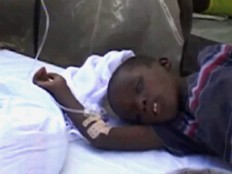|
||||||||||||||||||
|
|
Haiti - epidemic : Vulnerability of children to cholera 05/01/2011 15:03:17
Why pay special attention to children? Children are still growing. Because their body surface is less important, the cholera vibrio occupies the intestine faster and the disease spreads more quickly. In comparison, the same amount of vibrio affect much more a child than an adult. Furthermore, their immune systems are not fully developed. They are therefore more vulnerable to cholera and have more difficulty fighting infection. In addition, children have not mastered hygiene measures, which may promote contamination. This may be an additional vulnerability factor but not an absolute truth because the behavior of adults is substantially similar. Do you offer a specific treatment? The treatment is identical to that of adults. Oral rehydration for simple cases and intravenously in severe cases. The essential particularity is the dose calculation and the flow of solution to be administered by age, nutritional status and possible associated pathologies. When fluid losses are extremely abundant, rehydration is completed by antibiotic treatment, administered according to weight, for children over one year. Staff should be experienced in pediatrics because dehydration causes dry veins making it difficult to pose an infusion in a child. Sometimes biting the arm is not possible, then we try in the hand, leg and head. Ultimately, we practice an injection intra-osseous. A delicate operation but which must be done quickly because for a child with severe dehydration, the time factor is decisive. Because they require special attention and nursing staff adjusted the children are supported in a specific space. On an inpatient capacity of 336 beds (14 of 24 tents beds) in our cholera treatment center of Sarthe, 72 beds (21.4%) are dedicated to pediatrics. A figure that varies because we continually adapt our response to the evolution of the epidemic. What are the specific difficulties related to children? First there is the issue of underlying diseases: pneumonia, asthma, which complicate the treatment and made vulnerable especially children. We deal primarily cholera, which is vital emergency, then the other disease with appropriate treatment. For the particular case of malnutrition, whose treatment is not compatible with the management of cholera, we transfer the children cured of cholera in structures MSF specialist in nutrition. We are also faced with cases of children without parental authority. There are children who arrive alone, either because their parent(s) are sick or because there are other dependent children at home. Sometimes the child is abandoned because cholera is still afraid. Once cured, the social assistance supports them. But with informational messages and awareness, this becomes more rare. Last cholera assessment: Since the beginning of the epidemic of cholera in the country (October 19, 2010), 157.321 people were infected and treated, 87.639 people were hospitalized and 3.401 people died. According to the latest report from the Ministry of Public Health and Population (MSPP), dated of December 29, 2010. HL/ MSF
|
|
|
Why HaitiLibre ? |
Contact us |
Français
Copyright © 2010 - 2024 Haitilibre.com |



